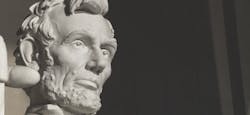Lennon, Lincoln, and Leadership
Something about my brain causes songs to pop up for almost any occasion. When my daughter was 10, we played a game where she would say a word and I had to respond with a song containing that word. I impressed her with my skills back then, but now that she’s 32 and a nurse in Chicago, one of the COVID-19 hot spots, maybe not so much.
Today I heard a commentator say to his cohost after a coronavirus update, “Strange days, Ted.” The cohost retorted, “Strange days, indeed!” And I wondered how many in the audience of perhaps millions immediately thought (or, like me, said out loud), “Most peculiar, mama.” If that doesn’t strike a familiar chord with you, it’s the next line from the John Lennon song, “Nobody Told Me,” released after his death. The tune stayed with me all day and continues to pop into my head with every coronavirus update. Strange days, indeed.
As these tunes wander through my cerebral cortex, I wonder just how true it is. After so many disasters over the years, the phrase, “Life will never be the same,” is always there to contemplate.
I recall my paternal grandfather mentioning the 1918 Spanish influenza pandemic, but only in terms of how he lost his first wife to the flu just three months after my Aunt Eleanor was born (he remarried and had my father). As we know from history and recent comparisons to COVID-19, that pandemic was absolutely brutal, especially coming at the close of World War I, which unfortunately also served as a vehicle for spreading the virus around the world. Strange, though, to think that without the 1918 pandemic, my father wouldn’t have been born and I wouldn’t be here today.
I remember both of my parents telling stories about the Great Depression. I heard a lot about World War II, especially from my father, a decorated fighter pilot; not so much about his exploits but rather the impact of the war on people and on his own psyche. I’ve lived through Vietnam and the multiple calamitous events since—assassinations, terrorist attacks, mass school shootings—truly ugly stuff. But a global pandemic that kills hundreds of thousands, with the largest number of cases occurring in my own country? Almost everything shut down? Gas prices below $2 per gallon because no one’s traveling? Empty airline terminals? My own company’s business 90% suspended, with nearly every project put on hold? No, nobody told me there’d be days like these, not even Mama.
RELATED
- Are There Lessons From the Great Recession for the COVID-19 Pandemic?
- How the Coronavirus Is Affecting the Housing Industry
- 7 Leadership Examples That Work
- What Is the Role of the Leader?
So, What’s Next?
As of this writing, all 50 states have opened up to varying degrees. But case counts are a moving target and the virus is a moving target, too, mutating about every two weeks. By the time you read this, we will know—either phased reopening is working, or we got ahead of ourselves and made things worse. Even if things are clearly better, we’ve been cautioned not to relax or fall into complacency.
As many disasters as we’ve been through and recovered from, most memorable to me are perhaps 9/11 and the great housing crash 12 years back. But I can honestly say this one is the most tenuous. To call the final outcome uncertain hardly does it justice.
So, what do we do? What will truly make a difference? Who will lose ... and win? (Before someone jumps on me for saying there will be winners, it is true, although I’m not claiming it will be worth the price.) A substantial number of builders will fail during this crisis, but little has changed about the demographics of demand. As the economy recovers, builders that manage to come through the COVID-19 calamity will have a tremendous growth opportunity.
Two Sides to the Pandemic
Home building is officially open everywhere, and units under $300K seem to be doing well. Having said that, sales of existing homes are down, and that can cause the entire chain to stall. On one hand, mortgage rates are the lowest in history; on the other hand, underwriters and mortgage providers keep throwing more requirements at buyers. Yesterday a broker told me one firm is requiring that applicants have 12 months of reserve mortgage payments in savings before it will approve an application!
This changes daily, with even the most astute pundits and prognosticators being all over the map. One thing my 32 years working with builders have taught me is that a builder who just sits around and waits for something to happen is a rare find. As home builders, we are going to do something … but what?
I addressed the bigger picture and the kind of thinking required to beat the crisis in my recent probuilder.com article “Learning From COVID-19: Lasting Lessons to Shape Our Future.” And my article “What to Do When You Can’t Do It Together” outlines 20 specific actions any builder can take and how, ironically, during the pandemic, you may finally have time to fix or improve the things you’ve been putting off the past 10 years since emerging from the last downturn.
Reading About Our Leaders: the Presidents
With those two columns, I felt I’d covered things reasonably well from macro to micro, but then something unexpected happened.
Over the past few years, I’ve been reading the biographies of our greatest presidents—or at least those who have had the greatest impact. So far I’ve covered George Washington, Thomas Jefferson, John Adams, James Madison, Abraham Lincoln, Ulysses S. Grant, Theodore Roosevelt (a three-volume series), Franklin D. Roosevelt, Harry Truman, John F. Kennedy, Lyndon B. Johnson (a four-volume series), and Richard Nixon. To sum it up, there’s a lot of the good, bad, ugly, and yes, at times inspirational, for each of those presidents.
As the coronavirus pandemic grew and I watched our current leaders—with few exceptions—flounder in response, my mind kept returning to WWAD (What Would Abe Do?).
I was extolling the virtues of this history when a friend of mine (not a reader) asked me for the three greatest takeaways from those thousands of pages. My answer came quickly and without difficulty:
1. Hardly anyone today understands how and why this country was founded and the pure hell our Founding Fathers and the first three presidents went through to create and keep the Union together.
2. Ulysses S. Grant was actually a remarkable president, leading the country through insanely tough times during Reconstruction after the Civil War, and a truly good man, despite the treachery and thievery of many who surrounded him.
3. Abraham Lincoln is without a doubt not just the greatest president we’ve ever had, but the greatest leader of any kind America has known in its nearly 250 years.
I had just finished the definitive Lincoln biography, Team of Rivals: The Political Genius of Abraham Lincoln, by Doris Kearns Goodwin, and it left me convinced it should be required reading for every American.
As the coronavirus pandemic grew and I watched our current leaders—with few exceptions—flounder in response, my mind kept returning to WWAD (What would Abe do?). In his time, Lincoln did everything possible to keep the country together against incredibly strong forces bent on tearing it apart.
Think things are different today? I felt—after reading Kearns Goodwin’s book—not so much. No matter what side you come down on in our current crisis, you see the country being torn asunder by political rivals at all levels, not to mention in the media. Nixon absolutely faced the same obstacles, and the rivals were every bit as nasty.
When True Leadership Means Taking the Most Difficult Road
To secure the 1860 Republican presidential nomination, Lincoln had four primary rivals and was the clear underdog. Each of these men publicly, in so many words, described Lincoln as a low-rent, two-bit, self-taught “hick” country lawyer with no formal education, no money, and no record.
Lincoln had every right to despise each of them, yet he respected them for what they had accomplished, the positions they’d attained, and the influence they brought. Rather than walk away or attempt to marginalize these rivals, he did what his closest advisors and confidants railed against privately: He made each of his rivals a member of his cabinet. He needed them to help him pull the country together. We would say he took the hardest possible road. Lincoln would say he took the only possible road for success.
The Rest Is History ... But
We could stop right there and say, “and the rest is history,” but it’s worth pondering. Lincoln faced the greatest threat to keeping the grand experiment that was the United States of America—less than 100 years old and watched closely by every other country in the world—together. We forget that no other true democratic republic of any size had ever been so formed and maintained, in all of history.
Lincoln exhibited an unusual combination of vision and principle, and all the while he was exceedingly practical. He tried multiple ways to get the South to renounce slavery, even supporting a plan to buy out “the property” of the slaveholders over a number of years to create a gradual transition. Lincoln has been criticized for this, but although privately he felt a war was virtually inevitable, he had to show that he and the North had done everything possible to avoid it. The country was so divided at the time—believe it or not, worse than today—that Lincoln saw the only possible route was to bring his rivals together on the same team.
Lincoln exhibited an unusual combination of vision and principle, and all the while he was exceedingly practical.
It wasn’t easy. The battles with and among cabinet members and Lincoln went on each day of his presidency. But Lincoln had no use for yes-men and glad-handers. He demanded honesty, even when he totally disagreed with those who had different opinions. He was famous for asking for feedback from and listening intently to those who opposed him. He would respond and adjust to good arguments, but when he had to move in another direction, he was always respectful and never held a grudge.
Lincoln achieved something almost impossible for most of us: To be seen as the ultimate authority, in complete control, yet also to be viewed as one who would listen to and value the input of others. That’s what Lincoln got from his team of rivals, and together they shepherded us through the darkest period in American history, emerging bruised and battered, but intact.
Personal Lessons in Leadership
The leadership lessons from Lincoln defy presenting a list of five or 10 things for you to emulate. Doing so would be an oversimplification and an insult to Lincoln’s name and service to our country. Besides, these lessons are personal. They will come to you differently from how they came to me, but trust me, they will come.
Reading about Lincoln will help you in your response to the current crisis, and those who will come in the future. One hundred and fifty years ago, leadership is what saved the United States and kept the Union together. I have been asked repeatedly since March what I view as making the greatest impact on our post-coronavirus world and I will tell you that, ultimately, it’s as simple—and as difficult—as this: leadership.
For a free PDF of his series on surviving the coronavirus crisis and any downturn, email your request to [email protected]. Please put “Crisis Survival” in the subject line.
Access a PDF of this article in Pro Builder's July/August 2020 digital edition

